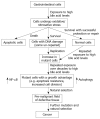Bile acids as endogenous etiologic agents in gastrointestinal cancer
- PMID: 19610133
- PMCID: PMC2712893
- DOI: 10.3748/wjg.15.3329
Bile acids as endogenous etiologic agents in gastrointestinal cancer
Abstract
Bile acids are implicated as etiologic agents in cancer of the gastrointestinal (GI) tract, including cancer of the esophagus, stomach, small intestine, liver, biliary tract, pancreas and colon/rectum. Deleterious effects of bile acid exposure, likely related to carcinogenesis, include: induction of reactive oxygen and reactive nitrogen species; induction of DNA damage; stimulation of mutation; induction of apoptosis in the short term, and selection for apoptosis resistance in the long term. These deleterious effects have, so far, been reported most consistently in relation to esophageal and colorectal cancer, but also to some extent in relation to cancer of other organs. In addition, evidence is reviewed for an association of increased bile acid exposure with cancer risk in human populations, in specific human genetic conditions, and in animal experiments. A model for the role of bile acids in GI carcinogenesis is presented from a Darwinian perspective that offers an explanation for how the observed effects of bile acids on cells contribute to cancer development.
Figures
Similar articles
-
Bile acids as carcinogens in human gastrointestinal cancers.Mutat Res. 2005 Jan;589(1):47-65. doi: 10.1016/j.mrrev.2004.08.001. Mutat Res. 2005. PMID: 15652226 Review.
-
Cross-talk between bile acids and gastrointestinal tract for progression and development of cancer and its therapeutic implications.IUBMB Life. 2015 Jul;67(7):514-23. doi: 10.1002/iub.1399. Epub 2015 Jul 15. IUBMB Life. 2015. PMID: 26177921 Review.
-
Secondary bile acids: an underrecognized cause of colon cancer.World J Surg Oncol. 2014 May 24;12:164. doi: 10.1186/1477-7819-12-164. World J Surg Oncol. 2014. PMID: 24884764 Free PMC article. Review.
-
Bile acids as carcinogens in the colon and at other sites in the gastrointestinal system.Exp Biol Med (Maywood). 2023 Jan;248(1):79-89. doi: 10.1177/15353702221131858. Epub 2022 Nov 19. Exp Biol Med (Maywood). 2023. PMID: 36408538 Free PMC article. Review.
-
Field defects in progression to gastrointestinal tract cancers.Cancer Lett. 2008 Feb 18;260(1-2):1-10. doi: 10.1016/j.canlet.2007.11.027. Epub 2007 Dec 31. Cancer Lett. 2008. PMID: 18164807 Free PMC article. Review.
Cited by
-
The solute carrier family 10 (SLC10): beyond bile acid transport.Mol Aspects Med. 2013 Apr-Jun;34(2-3):252-69. doi: 10.1016/j.mam.2012.07.004. Mol Aspects Med. 2013. PMID: 23506869 Free PMC article. Review.
-
Bidirectional effects of the tryptophan metabolite indole-3-acetaldehyde on colorectal cancer.World J Gastrointest Oncol. 2024 Jun 15;16(6):2697-2715. doi: 10.4251/wjgo.v16.i6.2697. World J Gastrointest Oncol. 2024. PMID: 38994159 Free PMC article.
-
Maspin is a deoxycholate-inducible, anti-apoptotic stress-response protein differentially expressed during colon carcinogenesis.Clin Exp Gastroenterol. 2011;4:239-53. doi: 10.2147/CEG.S24093. Epub 2011 Oct 3. Clin Exp Gastroenterol. 2011. PMID: 22162927 Free PMC article.
-
Mechanisms by which the intestinal microbiota affects gastrointestinal tumours and therapeutic effects.Mol Biomed. 2023 Nov 30;4(1):45. doi: 10.1186/s43556-023-00157-9. Mol Biomed. 2023. PMID: 38032415 Free PMC article. Review.
-
Bile acid metabolites control TH17 and Treg cell differentiation.Nature. 2019 Dec;576(7785):143-148. doi: 10.1038/s41586-019-1785-z. Epub 2019 Nov 27. Nature. 2019. PMID: 31776512 Free PMC article.
References
-
- Bernstein H, Bernstein C, Payne CM, Dvorakova K, Garewal H. Bile acids as carcinogens in human gastrointestinal cancers. Mutat Res. 2005;589:47–65. - PubMed
-
- Reddy BS. Diet and excretion of bile acids. Cancer Res. 1981;41:3766–3768. - PubMed
-
- Cherbonnel-Lasserre C, Gauny S, Kronenberg A. Suppression of apoptosis by Bcl-2 or Bcl-xL promotes susceptibility to mutagenesis. Oncogene. 1996;13:1489–1497. - PubMed
-
- Cherbonnel-Lasserre C, Dosanjh MK. Suppression of apoptosis by overexpression of Bcl-2 or Bcl-xL promotes survival and mutagenesis after oxidative damage. Biochimie. 1997;79:613–617. - PubMed
Publication types
MeSH terms
Substances
Grants and funding
LinkOut - more resources
Full Text Sources
Other Literature Sources


